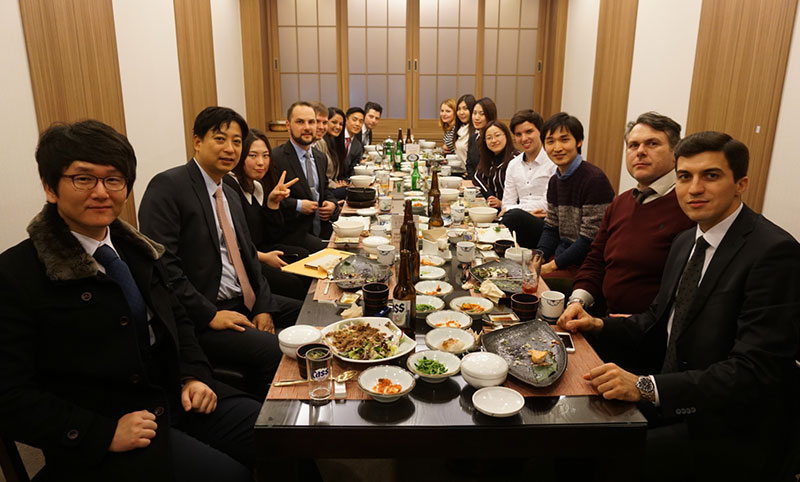By Addam Kaufman
Courses like the Int. Biz Neg. Sim. offer invaluable benefits for students who will find themselves increasingly working beyond our borders through commerce, globalization, the spread of democratic institutions, and immigration. The course teaches students the key aspects of international business agreements, and then puts the class up against a team of Korean students from their top law school in a mock negotiation that takes place via videoconferences.
The mock negotiation allows students to practice their skills in a truly international setting without the inconvenience of traveling abroad. And while books and lectures are able to explain the law and teach strategies, the course also gives students the ability to apply their education in a deeply motivated fashion. The competitive nature of the interschool, international, and adversarial setting creates a powerful motivating factor for students to master the nuts and bolts of an international license agreement and learn the drafting strategies necessary to come out with favorable terms.
The course also features an optional trip to Korea to meet the opposing team at the end of the semester.
It starts like any other class: you get one book and one professor with a lecture. Only, the professor is Jimenez and, for anyone who does not yet know Professor Jimenez, his experience spans decades and his connections cross continents. (Side note: He’s also the most interesting man ever.) And the book is incredibly on-point and advantageous when it comes to international negotiation game time too. I found myself referring to it several times over the course of the negotiation.
If you’ve had Jimenez for Civ. Pro., get ready for a surprise – he does lecture, but he focuses more on highlighting the major arteries of an international license agreement in order to help your team brainstorm strategies to get your pretend client favorable terms. The course is worth taking even if you simply want to improve your redlining or want a crash course on business negotiations, BATNA and all.
However, the course shows real swag when you meet the opposing Korean team and start the mock negotiation. The negotiation itself works well using Skype-style videoconferences and each teams is given enough leeway to communicate as much as necessary to come to a final agreement.
The thing that surprised me the most was how much more there is to negotiations than you will ever find in a book (like how to deal with one really irritating opposing team member while keeping everyone else on track).
In addition, the course has the added benefit of giving students a natural networking opportunity in Korea and beyond. Since the course concludes with an optional trip to Korea to meet the opposing team, students are given access to the connections Santa Clara Law has there. Take my advice: the trip is well worth it. For me, it seemed less like a post-game handshake session and more like a celebration of Santa Clara’s reach and a “welcome to Korea” (and, more importantly, a “welcome to Korea’s legal job market”).
In Korea, we were treated very well. We were accommodated at Seoul National University, and being Korea’s top law school, we were considered by locals as part of the legal elite by association. We were also the guests of Santa Clara alumni and Korea’s biggest law firm, Kim & Chang, both of which gave us an insider’s take on Korea’s job market and the surrounding regions (including China). We even had lunch with the chairman of Korea’s largest private TV station, MBC, and a former Korean Supreme Court Justice. Having lived and worked in Asia for over half a decade myself, I know that it takes years (perhaps even decades) to make such high-reaching connections there and that speaks volumes of Santa Clara Law’s reach.
In short, the course offers a nuts-and-bolts look at international license agreements and the strategies it takes to get favorable terms. Students are also able to practice negotiating against future foreign attorneys. And, as an added bonus, students can walk away from the course with some solid connections in Korea (not to mention a trip to Korea, if you opt for it). In my opinion, this kind of course is the future of legal education generally, and specifically, the kind of thing that makes sense for Santa Clara Law, given our depth in IP, our access to the Valley, and our connections abroad.
The course is available in the fall semester under the official name International Business Negotiation – Simulation. Enrollment is limited and you must get Prof. Jimenez’s approval to join.

International Business Negotiations Simulation students in Korea.
